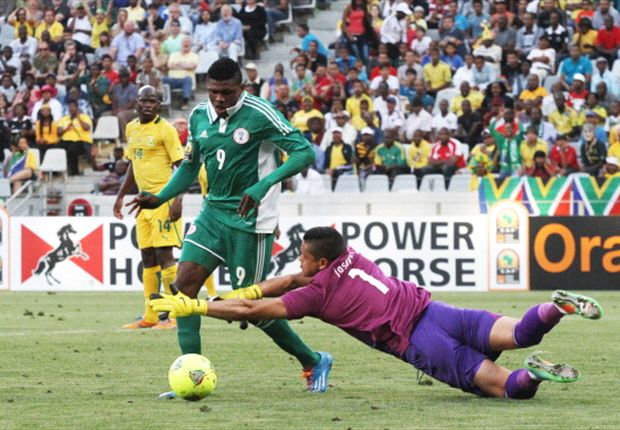
Needing a win against South Africa in order to reach the knock out stage, coach Stephen Keshi made one change to the team that had won so unconvincingly against Mozambique: Bendel Insurance left back Erhun Obanor came into the starting eleven; Ugonna Uzochukwu dropped to the bench. He also made a formation change, starting this game with a 4-2-3-1.
Just like he did in the previous game, Keshi made adjustments to correct areas of weakness. Out went the suicidal high line and disjointed pressing, when the team defended, they dropped back into a 4-4-1-1 with two banks of four, covering zones well. Rabiu Ali and Gbolahan Salami generally let the South African central defenders have the ball, but pressed when the ball was played into the midfield zone.
The most interesting feature of this game tactically was the inclusion of Enyimba’s Bright Esieme. A right back by trade, he played on the left of defence in the game against Mozambique. Here, he was surprisingly fielded in midfield alongside Abdullahi Shehu, and was clearly instructed to shadow Siphiwe Tshabalala. Keshi wanted a defensively savvy person on this beat, but it is unclear why he felt Esieme would be a good fit, considering Umar Zango came on to good effect in the previous game. He maybe felt the Enyimba man’s energy would be suited to the task.
Whatever the reasoning behind the move, it worked wonderfully well. Tshabalala spent the entire game trying to escape Esieme’s attention, and kept dropping deeper to get on the ball. Esieme tracked him all the way though, and he exerted little influence on the game; it is telling that the only time he got the ball in useful areas was when Obanor went off for Zango and Esieme reverted to left back.

Salami wins a penalty off Josephs
Going forward, the front three rotated positions quite well. Rabiu
Ali had another good game playing even closer to Salami upfront. His
movement and positioning was exemplary, and his slick one-two with
Ifeanyi Ede was cut back by the latter for Ejike Uzoenyi to open the
scoring on 21 minutes. Ten minutes later, Ede doubled the lead from the
spot after a clanger from Bafana stand-in goalkeeper Moeneeb Josephs.At this point, Bafana manager Gordon Igesund made a curious first half substitution: Mamelodi Sundowns’ striker Katlego Mashego came on for Ryan Chapman, and partnered Bernard Parker upfront. This is the classic case of a reactionary substitution: Chapman had actually been playing well, finding space between the lines due to Esieme’s extreme man-marking of Tshabalala and also Shehu’s positional indiscipline. It was a painfully simplistic sub; he needed to score so he threw on another striker. It took the impetus out of their attacking play and made it easier for the Super Eagles.
A special mention must go to Ejike Uzoenyi, who scored a beautiful third on 64 minutes after playing a one-two with Salami. Aside his brace, he crashed another effort against the crossbar after setting himself up smartly. After a lackluster first two games, he took this by the scruff of the neck, showing amazing skill and drawing fouls with his provocative style of play. His game still needs refinement in some areas though, notably his decision making, but in there is a smashing footballer. He was a deserving man of the match.
In the end, there was an unmistakable gulf in class between both teams on the night: the Super Eagles were up for it and had more quality. The mistakes of the previous game were dealt with by Keshi, and there was better cohesion. The margin of victory did not flatter them.
Nigeria are through to the next round, but worries remain. Chief among them is the center back pairing of Odunlami and Egwuekwe, which utterly lacks composure. The switch to two banks of four did well to protect them; they were ruthlessly exposed against Mozambique. Solomon Kwambe fared little better, and will miss the quarter final due to his sending off late on. This will in all likelihood see Esieme get a run at right back where he is most comfortable.
No comments:
Post a Comment